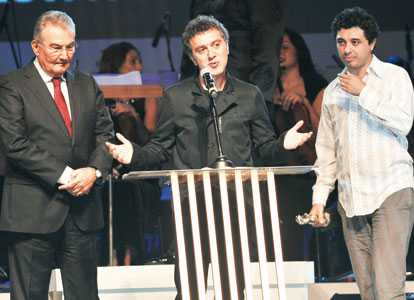BARÇIN YİNANÇ
ISTANBUL- Hürriyet Daily News
At a cultural program in Istanbul last week, supported by the EU and intended to bring French and Turkish directors together, Turkish director Reha Erdem said there are currently Turkish movies that break box office records and appeal to audiences all over the world. Erdem praised the funding generosity of the EU, and is particularly grateful to France for its support of independent cinema.

Turkish cinema has never been so colorful, diverse and productive, and when one speaks about Turkish culture, Turkish cinema comes to mind first, according to a prominent Turkish director.
Turkish director Reha Erdem said at an EU cultural bridges program panel last week that Turkish movies are now breaking box office records all over the world. Praising EU funding for the joint production of movies, Erdem said she was particularly grateful to France for its support of independent cinema.
ARTE and cultural difference
Michel Reilhac, the head of the French branch of ARTE, a European cultural television channel, explained how the launching of the television station nearly 20 years ago by French President François Mitterand and German Chancellor Helmut Kohl had contributed to the European movie industry and continues to function as a cultural bridge.
The founders of ARTE believed it would bring French and German citizens closer on a cultural level, and would promote cultural integration throughout Europe. It was a political initiative they believed would foster cultural integration, providing a vehicle for a political process that would give flesh to the very idea of the EU.
The launching of ARTE marked the first and only time a television channel was created for audiences in two different countries. “The challenge at the start was to set up a channel that provided the same programming for two different cultures,” Reilhac said.
“Seeing how ARTE has been able to provide a bridge for cultural differences between France and Germany has been fascinating,” he said.
“We saw how different from Germany we were. We have a different sense of humor and different literature. ARTE allowed us to confront and appreciate these differences. We seldom agree on one program, and we know that decisions will never be 100 percent satisfactory for both sides, but we manage,” Reilhac said.
Reilhac said France is now working on setting up similar projects, funded in cooperation with Italy, Belgium, Poland and Spain.
A key personality in the French audiovisual and filmmaking landscape, Reilhac also spoke about trans-media, a new phenomenon in the industry. “It is a new form of story telling, and is being invented as we speak,” he said. “It is not limited to one platform, and can be used with cell phones, computers, and televisions.”
The importance of film festivals
While Reilhac believes we need to stop thinking that films can only be seen in theaters, he still thinks watching a film in a theater provides the best way to access a film. “Theaters won’t disappear, and festivals will grow in importance,” he said.
The Istanbul Film Festival’s 30-year existence stands as a testimony to Reilhac’s views. “Although it has now become much easier to access films, interest in the Istanbul Film Festival keeps increasing,” said Azize Tan, director of the festival since 2006.
The festival began following the 1980 military coup, in a political environment that made it impossible to access new films and produce new movies. As its popularity increased, the festival has become a huge event, during which up to 220 films are shown to around 150,000 people.
Moderated by Serra Yılmaz, one of the best-known Turkish actresses in Europe, Italian actress Lavinia Longhi, who played Claudia Cardinale in Ali İlhan’s “La Signora Enrica,” also attended the panel. The movie is set to be screened in Turkey soon.
The cultural bridges program encourages actors and cultural organizations in Turkey and the EU to cooperate in contemporary arts and culture projects.

Leave a Reply